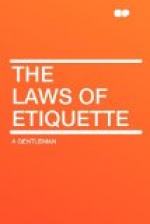These forms may be abundantly absurd, but still they must be attended to; for one half the world does and always will observe them, and the other half is at a great disadvantage if it does not. Intercourse is constantly taking place, and an awkward man of letters, in the society of a polished man of the world, is like a strong man contending with a skilful fencer. Mr. Addison says, that he once saw the ablest mathematician in the kingdom utterly embarrassed, from not knowing whether he ought to stand or sit when my lord duke drank his health.
Some of the many errors which are liable to be committed through ignorance of usage, are pleasantly pointed out in the following story, which is related by a French writer.
The Abb, Cosson, professor in the College Mazarin, thoroughly accomplished in the art of teaching, saturated with Greek, Latin, and literature, considered himself a perfect well of science: he had no conception that a man who knew all Persius and Horace by heart could possibly commit an error—above all, an error at table. But it was not long before he discovered his mistake. One day, after dining with the Abb, de Radonvillers at Versailles, in company with several courtiers and marshals of France, he was boasting of the rare acquaintance with etiquette and custom which he had exhibited at dinner. The Abb, Delille, who heard this eulogy upon his own conduct, interrupted his harangue, by offering to wager that he had committed at least a hundred improprieties at the table. “How is it possible!” exclaimed Cosson. “I did exactly like the rest of the company.”
“What absurdity!” said the other. “You did a thousand things which no one else did. First, when you sat down at the table, what did you do with your napkin?” “My napkin? Why just what every body else did with theirs. I unfolded it entire]y, and fastened it to my buttonhole.” “Well, my dear friend,” said Delille, “you were the only one that did that, at all events. No one hangs up his napkin in that style; they are contented with placing it on their knees. And what did you, do when you took your soup?” “Like the others, I believe. I took my spoon in one hand, and my fork in the other—” “Your fork! Who ever eat soup with a fork?—But to proceed; after your soup, what did you eat?” “A fresh egg.” “And what did you do with the shell?” “Handed it to the servant who stood behind my chair.” “With out breaking it?” “Without breaking it, of course.” “Well, my dear Abb,, nobody ever eats an egg without breaking the shell. And after your egg—?” “I asked the Abb, Radonvillers to send me a piece of the hen near him.” “Bless my soul! a piece of the hen? You never speak of hens excepting in the barn-yard. You should have asked for fowl or chicken. But you say nothing of your mode of drinking.” “Like all the rest, I asked for claret and champagne.” “Let me inform you, then, that persons always ask for claret




